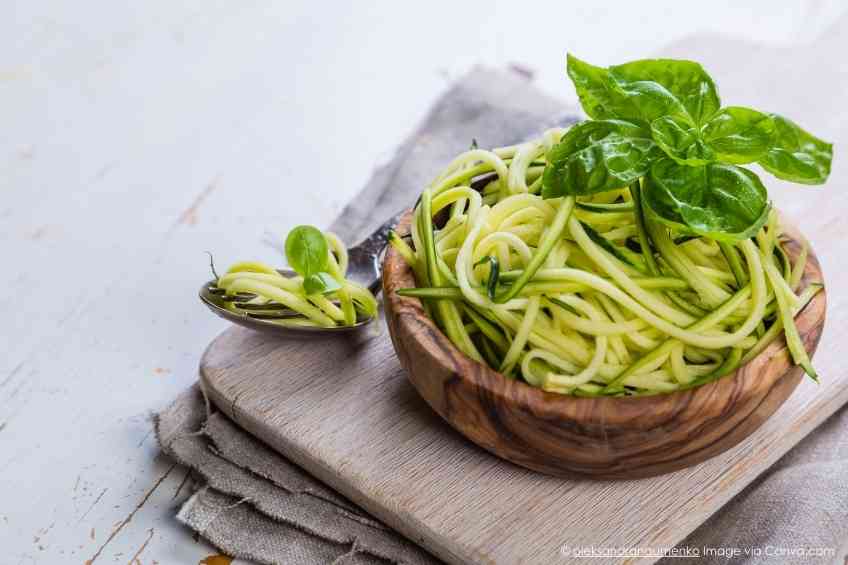The Skinny:
An awful lot of people just can’t get enough pasta—and for many, that’s a problem. Those suffering from celiac disease are at particular risk from traditional, wheat-based pasta because of its gluten content. But even those who are gluten-sensitive need to keep heavy amounts of traditional pasta at bay. Then there are those who simply need to avoid pasta as part of their weight management effort. Traditional pasta, after all, is high in carbohydrates, making it a potential food gateway for packing on unwanted pounds. These types of concerns can be pretty daunting and depressing. Fortunately, there are an exploding number of pasta alternatives made from plants and beans that offset these concerns and serve up nicely. It is important to note, however, that these popular & healthy pasta alternatives are not always enriched with iron, riboflavin, thiamine and folic acid that are found in traditional pasta.
The Slate:
Palmini Pasta
Palmini is new and a bit of an outlier when it comes to alternative pasta. Palmini is made from hearts of palm and has already received great reviews from consumers. It is versatile and low in calories with only 25 in each cup. These linguine-like noodles also have five grams of carbohydrates in each cup. The noodles can easily be applied to soups and tractional pasta dishes.
Shirataki Noodles
Known as miracle noodles by some, shirataki noodles are a low-carb, low-calorie pasta alternative that are made from the glucomannan fiber, which comes from the konjac plant. As a soluble fiber, these noodles help slow digestion, making people feel fuller for longer periods of time. Extremely versatile, these noodles can be prepared by placing them in hot water or heating them up in a skillet.
Chickpea Pasta
Chickpeas are nutritious legumes that have antioxidant properties. They are also believed to be able to deliver high volumes of dietary fiber, vitamin A, vitamin E, vitamin C, folate, magnesium, potassium and iron. Besides all this, chickpeas—also known as garbanzo beans—can be turned into flour to make a sturdy alternative pasta.
Cabbage Noodles
Yet another largely unrecognized alternative to traditional pasta is cabbage noodles. Low in carbohydrates, a 100-gram serving of these noodles supplies 54 percent of the daily recommended intake of vitamin C and 85 percent of vitamin D. They are also a good source of folate. Better still, cabbage noodles are easy to prepare.
Spiralized Vegetables
Spiralized vegetable noodles are a great and healthy alternative to traditional pasta and can be easily made at home using a spiralizer. A variety of different vegetables can be applied but zucchini and butternut squash are probably the most popular choices. These noodles are high in fiber and antioxidants and low in carbohydrates compared to grain or legume-based noodles.
Spaghetti Squash
Another increasingly popular vegetable-based pasta alternative is spaghetti squash. It appears in spaghetti-like strands when cooked and is lower in carbs and calories than traditional pasta. It is also high in fiber, vitamins A and C and antioxidants. These noodles hold up well in heavier sauces.
Lentil Pasta
Lentil pasta is a mainstream alternative pasta. As the name implies it is made from red or green lentils. High in fiber and protein, it boasts a similar texture to traditional pasta. It is also rich in vitamins, minerals and antioxidants.
Quinoa Pasta
Quinoa pasta is yet another option that is gluten-free and still rich in protein, fiber and essential amino acids. It’s also a good source of magnesium, which supports muscle and nerve function. Works well with light sauces and in salads.
Brown Rice Pasta
Brown rice pasta is gluten-free but purportedly retains more nutrients and benefits than traditional pasta, including fiber, manganese and selenium. The higher fiber content helps keep people full longer and supports a healthy digestive system. It serves up well with tomato-based sauces.
Black Bean Pasta
A relatively new option, black bean pasta is high in plant-based protein and fiber. It is also loaded with nutrients like iron, magnesium and calcium, making it good for bone and heart health. Holds up well to spicy tomato sauces.
Eyes Up:
What’s your favorite alternative pasta? Let us know at info@wellwellusa.com.










